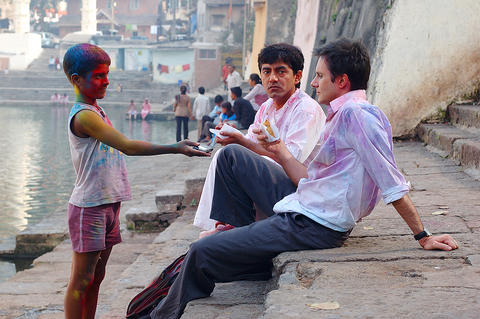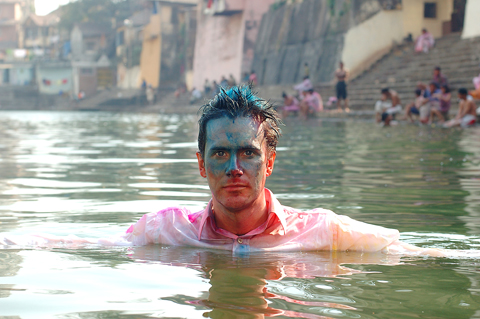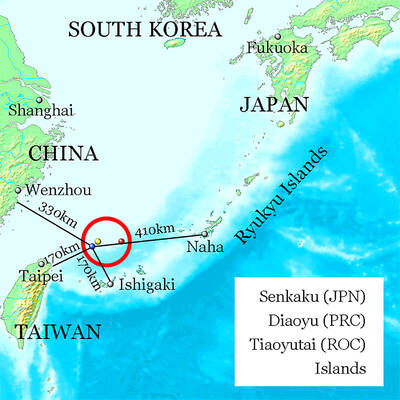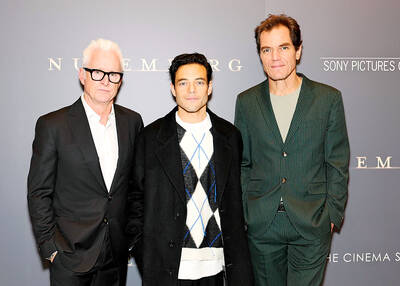Outsourced, in which a Seattle call center manager named Todd (Josh Hamilton) is fired and then dispatched to India as a consultant to train his own replacement, is a wonderful surprise.
At first it threatens to be just another fish-out-of-water story. The film’s director, John Jeffcoat and his co-writer, George Wing, hit expected marks, from the moment when a street urchin swipes the hero’s cellphone to the bit where Todd learns why Indian people don’t eat with their left hand to the scene where Todd realizes that his sharpest employee, an outspoken young woman named Asha (Ayesha Dharker), is gorgeous and has a crush on him.
Gratifyingly, though, the filmmakers treat Todd’s story as a springboard for a smart look at the effect of cultural difference on work, friendship and love, and the global economy’s impact on national and personal identity.

PHOTOS: COURTESY OF JOINT ENTERTAINMENT
Todd, being American, has no sense of himself as an American. He has an allergic reaction to Indian culture (embodied by the intestinal distress he suffers after eating local food). He is also taken aback by Indians’ emphasis on family ties and social obligations, and they in turn are politely aghast at Todd’s disconnection from his own relatives.
Todd’s trainee, the polite, 40-ish Puro (Asif Basra), lives with his parents and is surprised that Todd lives alone and rarely visits his own mother. He insists that Todd forgo his prearranged hotel room and stay at his home, where his mom cooks up a storm and grills Todd on why he isn’t married yet.
Todd is initially concerned with improving his employees’ minutes-per-call rating and going home. He’s bored by his job and can’t believe that his employees like the kitschy Americana (including Green Bay Packers cheese hats) sold through his company’s catalog.

PHOTOS: COURTESY OF JOINT ENTERTAINMENT
But during an impulsive trip to a McDonald’s knockoff that doesn’t serve beef, he meets a fellow American (Larry Pine, in a brilliant cameo) who advises him: “I was resisting India. Once I gave in, I did much better.”
Todd has an epiphany while wading into a local water tank (photographed, with cross- cultural wit, to suggest a baptism). He also comes to understand Indians’ comfort with images of Kali, the Hindu goddess of creation, preservation and destruction. Todd learns that change can be negative, positive or simply neutral, and what matters is how one reacts to it.
The film shows that individuals in every nation are nearly powerless before the global economy, a force that shatters tradition and compels people to think of themselves as self-interested free agents. This pragmatic point of view is articulated by Asha, who rhetorically asks Todd why it’s necessary for Indian call-center workers to pose as Americans while selling cheap junk made in China.

PHOTOS: COURTESY OF JOINT ENTERTAINMENT
The key to survival is adaptability, a quality demonstrated by every major character in Outsourced — particularly Todd, who adapts to his hosts’ culture and language and makes them more invested in their jobs by rewarding efficiency gains with products from the company’s catalog.
In its modest way, Outsourced may be unique: a charming culture-clash romance that could be taught in business schools.

The Nuremberg trials have inspired filmmakers before, from Stanley Kramer’s 1961 drama to the 2000 television miniseries with Alec Baldwin and Brian Cox. But for the latest take, Nuremberg, writer-director James Vanderbilt focuses on a lesser-known figure: The US Army psychiatrist Douglas Kelley, who after the war was assigned to supervise and evaluate captured Nazi leaders to ensure they were fit for trial (and also keep them alive). But his is a name that had been largely forgotten: He wasn’t even a character in the miniseries. Kelley, portrayed in the film by Rami Malek, was an ambitious sort who saw in

Last week gave us the droll little comedy of People’s Republic of China’s (PRC) consul general in Osaka posting a threat on X in response to Japanese Prime Minister Sanae Takaichi saying to the Diet that a Chinese attack on Taiwan may be an “existential threat” to Japan. That would allow Japanese Self Defence Forces to respond militarily. The PRC representative then said that if a “filthy neck sticks itself in uninvited, we will cut it off without a moment’s hesitation. Are you prepared for that?” This was widely, and probably deliberately, construed as a threat to behead Takaichi, though it

Among the Nazis who were prosecuted during the Nuremberg trials in 1945 and 1946 was Hitler’s second-in-command, Hermann Goring. Less widely known, though, is the involvement of the US psychiatrist Douglas Kelley, who spent more than 80 hours interviewing and assessing Goring and 21 other Nazi officials prior to the trials. As described in Jack El-Hai’s 2013 book The Nazi and the Psychiatrist, Kelley was charmed by Goring but also haunted by his own conclusion that the Nazis’ atrocities were not specific to that time and place or to those people: they could in fact happen anywhere. He was ultimately

Nov. 17 to Nov. 23 When Kanori Ino surveyed Taipei’s Indigenous settlements in 1896, he found a culture that was fading. Although there was still a “clear line of distinction” between the Ketagalan people and the neighboring Han settlers that had been arriving over the previous 200 years, the former had largely adopted the customs and language of the latter. “Fortunately, some elders still remember their past customs and language. But if we do not hurry and record them now, future researchers will have nothing left but to weep amid the ruins of Indigenous settlements,” he wrote in the Journal of